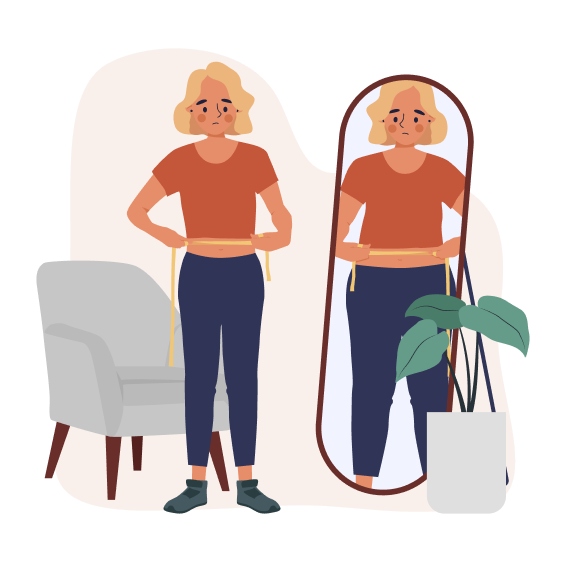
Symptoms Of Pelvic Floor Dysfunction During Menopause
Menopause can cause hormonal changes that impact the pelvic floor muscles, resulting in dysfunction. The common symptoms women may experience are:
- Difficulty controlling urination (incontinence).
- Frequent urination or feeling of incomplete emptying.
- Constipation or trouble passing stool.
- Chronic pelvic, lower abdomen, or back pain.
- A sensation of pressure or heaviness in the pelvic area.
- Pain or discomfort during intercourse.
- Vaginal dryness and reduced elasticity.

Causes Of Pelvic Discomfort During Menopause
Studies show that pain and discomfort in the pelvic area are more common during perimenopause and menopause due to hormonal changes and weakening pelvic muscles. Here are some reasons that lead to pelvic pain during menopause.
Key benefits of seeing a pelvic floor physical therapist postpartum:
- Hormonal Changes
- Vaginal Atrophy
- Urinary Tract Issues
- Pelvic Organ Prolapse
- Muscle Strain
- Stress or Anxiety

How Does Functional Phyzio Help?
At Functional Phyzio, we provide tailored treatments for menopause and perimenopause, addressing hormonal changes and improving overall health. Depending on your needs, most treatment plans are between 8-12 visits.
These treatments help relieve symptoms like joint pain, fatigue, and muscle stiffness for a healthy, active life.
- Strengthening exercises to restore pelvic floor function.
- Manual therapy for improved flexibility and relief.
- Postural and full-body strengthening exercises.
- Referrals for pessary or hormone therapy if needed.

Benefits of Pelvic Floor Physical Therapy
Our Pelvic therapy treatment plans help reduce pain during perimenopause and menopause. Here are the benefits you can enjoy after undergoing pelvic floor therapy treatment.
- Improves bone and heart health
- Treats incontinence effectively.
- Enhances pelvic floor strength
- Reduces back and hip pain
- Prevents pelvic organ prolapse
- Boosts circulation and mobility
- Promotes relaxation and better sleep
- Balances hormones to reduce mood swings
- Strengthens core, improves posture
- Builds confidence and physical control
- Improves bladder and bowel function
- Supports long-term pelvic health
FAQs
01. Why pelvic floor therapy in menopause?
Pelvic floor therapy helps strengthen the muscles, reducing symptoms like incontinence, pelvic pain, and improving sexual health.
02. Does menopause affect mental health?
Yes, hormonal changes during menopause can result in mood swings, anxiety, sadness, and irritability. Exercise has been shown to be an effective way to combat mental health changes during menoapause and working with a physical therapist can help you learn how to exercise safely.
03. Are there treatments for menopause symptoms?
Treatments include hormone replacement therapy (HRT), medications for hot flashes, lifestyle changes, and pelvic floor therapy.
Book a session today!
If you’re experiencing pelvic discomfort or joint pain during menopause, book a session with us today to explore how we can support your journey toward better health.


